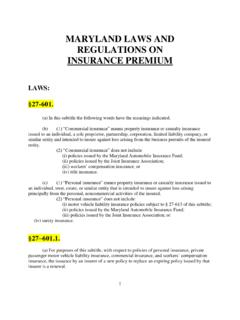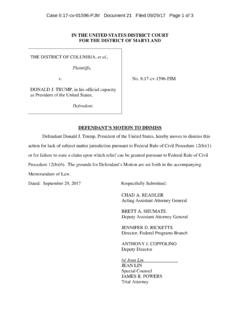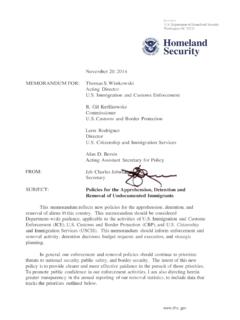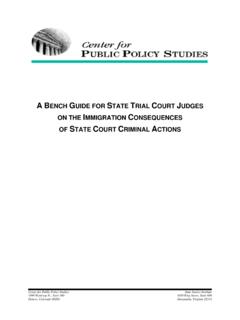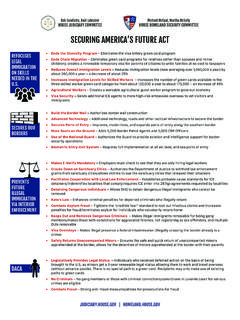Transcription of INTRODUCTION - Maryland Attorney General
1 INTRODUCTION For some time now, questions have arisen about the extent to which State and local law enforcement officials may, or are required to, assist immigration and Customs enforcement ( ICE ) and the Customs and Border Protection ( CBP ) officials with the enforcement of federal immigration law. In August 2014, our Office issued advice on the ICE detainers issued by federal immigration officials when they seek custody of suspected removable In that letter, our Office concluded that (a) compliance with ICE detainers is voluntary, and (b)
2 State and local law enforcement officials are potentially exposed to liability if they hold someone beyond his or her State-law release date without a judicial warrant or probable cause that the detainee has committed a In light of recent federal measures designed to restrict immigration and intensify the enforcement of federal immigration laws, we are now updating and supplementing our 2014 guidance. The purpose of this new guidance is to describe for Maryland State and local governments the current legal landscape governing the participation of law enforcement officials in immigration enforcement , and to help those officials make decisions about how to engage with federal immigration officers.
3 This guidance reaches several legal conclusions for State and local law enforcement agencies ( LEAs ) to consider as they interact with federal immigration law and officials: 1. LEAs face potential liability exposure if they seek to enforce federal immigration laws, particularly if they do so outside the context of a federal cooperation agreement under 8 1357(g)(1). 2. LEAs must absorb all costs associated with federal cooperation agreements under 8 1357(g)(1). The federal government does 1 Letter from Adam D.
4 Snyder, Chief Counsel, Opinions & Advice, to the Hon. Douglas W. Mullendore, Washington County Sheriff (Aug. 14, 2014). 2 This guidance applies equally to all non-federal law enforcement officers and agencies, whether they operate at the municipal, county, or state level. To distinguish those officers from federal immigration officers, we will sometimes refer to them together as local officials, but at other times we will refer to both State and local entities. These differences in nomenclature are not intended to have substantive effect.
5 2 not provide reimbursement for these agreements, and the agreements may increase the risk of unconstitutional profiling. 3. LEAs face potential liability exposure if they honor ICE or CBP detainer requests unless the request is accompanied by a judicial warrant or supported by information providing probable cause that the subject of the detainer has committed a crime. 4. State and local officers may not be prohibited from sharing information about a detainee s citizenship or immigration status with federal immigration officials, but they are not required to do so either.
6 5. As an overriding principle, the government bears the burden of proving that the detention of someone beyond the person s State-law release date does not violate the Fourth Amendment and its Maryland counterpart. AUTHORITIES GOVERNING LOCAL PARTICIPATION IN THE enforcement OF FEDERAL immigration LAWS A. The Tenth Amendment to the Constitution The Tenth Amendment to the United States Constitution3 limits the federal government s ability to mandate particular action by states and localities, including in the area of federal immigration law enforcement and investigations.
7 The federal government cannot compel the States to enact or administer a federal regulatory program, or compel state employees to participate in the administration of a federally enacted regulatory The anti-commandeering restrictions of the Tenth Amendment extend not only to states but also to localities and their Voluntary cooperation with a federal scheme does not present Tenth Amendment issues, but the federal government may not 3 The Tenth Amendment to the United States Constitution provides that powers not delegated to the United States by the Constitution, nor prohibited by it to the States, are reserved to the States respectively, or to the people.
8 4 New York v. United States, 505 144, 188 (1992) (federal government may not compel states to enact legislation providing for the disposal of their radioactive waste or else take title to that waste); Printz v. United States, 521 898, 935 (1997) (federal government may not require state and local law enforcement officers to perform background checks on prospective firearm purchasers). 5 See Printz, 521 at 904-05 (county); City of New York v. United States, 179 29, 34 (2d Cir. 1999) (municipality).
9 3 force state or local officials to carry out federal law, either directly or indirectly through the withdrawal of unrelated federal The Tenth Amendment bars the federal government from requiring local law enforcement officials to enforce federal immigration law. B. Federal immigration Laws 1. Information Sharing Under 8 1373 Federal law does not require any local governmental agency or law enforcement officer to communicate with federal immigration authorities. Rather, federal law only requires that state and local governments not bar their employees from sharing certain types of information with federal immigration authorities.
10 Specifically, 8 1373 provides that state and local governments cannot prohibit employees or entities from sending to, or receiving from, [federal immigration authorities] information regarding the citizenship or immigration status, lawful or unlawful, of any individual. 7 In addition, state and local governments may not impose restrictions on exchanging information regarding immigration status with any other Federal, State, or local government entity or on maintaining such By its terms, 8 1373 applies only to information regarding an individual s citizenship or immigration status.






